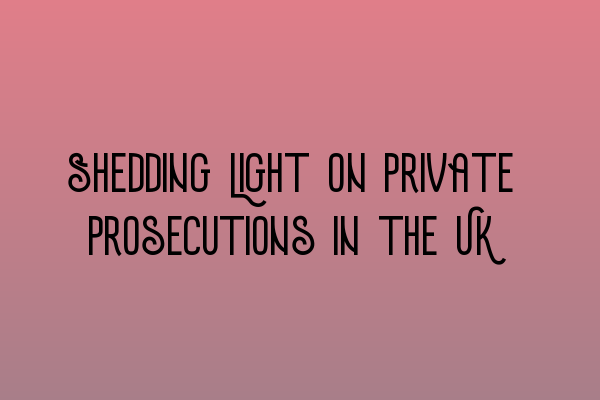Shedding Light on Private Prosecutions in the UK
Private prosecutions play a significant role within the UK legal system, offering individuals and organizations an alternative route to seek justice for criminal activities through the judicial process. Despite being less commonly known compared to public prosecutions, private prosecutions have gained increasing attention in recent years. In this blog post, we will explore the key aspects of private prosecutions in the UK, including the process, benefits, and considerations.
What Are Private Prosecutions?
Private prosecutions are legal proceedings initiated by individuals or entities other than government agencies or public prosecutors. They allow victims of criminal offenses to take legal action against the wrongdoer directly, without relying solely on law enforcement agencies or the Crown Prosecution Service (CPS).
The decision to pursue a private prosecution is influenced by various factors, including the availability of evidence, the complexity of the case, and the level of support from law enforcement agencies. Private prosecutions are particularly common in cases where the CPS decides not to prosecute, either due to lack of resources or evidential difficulties.
Private prosecutions can cover a wide range of criminal offenses, ranging from fraud and theft to assault and harassment. The process of initiating a private prosecution involves several steps, each of which must be carefully followed to ensure the proceedings are valid and compliant with the law.
The Process of a Private Prosecution
Initiating a private prosecution involves several key stages:
- Gathering Evidence: The first step is to collect substantial evidence to support the case. This may involve conducting investigations, gathering witness statements, and acquiring relevant documentation.
- Legal Advice: Seeking legal advice is crucial to assess the viability of the prosecution. A solicitor experienced in criminal law can provide guidance on the strength of the evidence, potential defenses, and the overall likelihood of success.
- Applying to the Court: An application for a summons or a warrant must be made to the appropriate court, accompanied by the evidence collected. The court will review the application and assess whether there is a prima facie case for prosecution.
- The Hearing: If the court grants the summons or warrant, a hearing will be scheduled. During the hearing, the defendant will have the opportunity to present their defense, and the prosecution will present its case based on the evidence collected.
- Judgment: Following the hearing, the judge will deliver a judgment based on the evidence presented. If the defendant is found guilty, the judge will determine the appropriate sentence.
- Appeals: Both the prosecution and the defense have the right to appeal the judgment if they believe there were legal errors or substantial procedural irregularities.
Throughout the entire process, it is crucial to ensure compliance with legal requirements and procedural rules to maintain the integrity of the private prosecution.
The Benefits of Private Prosecutions
Private prosecutions offer several advantages over traditional public prosecutions:
- Control: The prosecutor has greater control over the case compared to public prosecutions, including flexibility in making decisions and managing the process.
- Access to Justice: Private prosecutions provide an avenue for individuals who may have been overlooked by public authorities, allowing them to seek justice independently.
- Specialized Expertise: Private prosecutors can engage the services of experienced criminal solicitors who specialize in the area of law relating to the particular offense.
Considerations for Private Prosecutions
While private prosecutions offer a viable option for seeking justice, there are several important considerations to keep in mind:
- Costs: Private prosecutions can be costly, as the individual or organization initiating the prosecution is responsible for all associated expenses. It is important to carefully assess the financial implications before pursuing this route.
- Public Interest: Private prosecutors must demonstrate that the prosecution is in the public interest and not solely motivated by personal vendettas or gain.
- Legal Expertise: Seeking legal advice from a qualified criminal solicitor is essential to navigate the complexities of the legal process and maximize the chances of success.
Private prosecutions have the potential to be a powerful tool in securing justice, particularly in cases where public authorities may not have the resources or inclination to pursue criminal charges. By understanding the process, benefits, and considerations associated with private prosecutions, individuals and organizations can make informed decisions when seeking legal recourse.
Related Articles:
